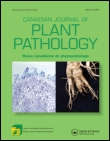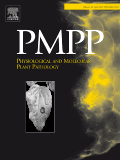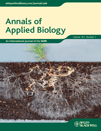
Australasian Plant Disease Notes
metrics 2024
Pioneering Research for Sustainable Agriculture
Introduction
Australasian Plant Disease Notes is a vital resource in the fields of Agronomy and Plant Science, published by SPRINGER. Established to address the increasing need for research dissemination on plant diseases in the Australasian region, the journal focuses on the sharing of innovative findings and methodologies pertinent to plant health and pathology. With an ISSN of 1833-928X and E-ISSN 1833-928X, this journal serves as an open platform for researchers to contribute original research, case studies, and reviews that enhance our understanding of plant diseases. Recognized in the academic community, it achieved a Q3 ranking in both Agronomy and Plant Science categories as of 2023, indicating its relevance and significance in the field. The journal aims to support researchers, professionals, and students by providing access to critical insights that can drive advancements in agricultural practices and plant conservation efforts. With a convergence of knowledge spanning from 2009 to 2024, Australasian Plant Disease Notes is poised to make a lasting impact in the study of plant health.
Metrics 2024
 0.28
0.28 0.60
0.60 0.80
0.80 21
21Metrics History
Rank 2024
Scopus
IF (Web Of Science)
JCI (Web Of Science)
Quartile History
Similar Journals

JOURNAL OF PHYTOPATHOLOGY
Advancing plant health through innovative research.JOURNAL OF PHYTOPATHOLOGY, published by Wiley, stands as a premier platform for disseminating cutting-edge research in the field of plant health, emphasizing the interactions between plants and pathogens. Since its inception in 1958, the journal has fostered a rich legacy of advancing scientific knowledge and understanding in areas encompassing Agronomy, Crop Science, Genetics, and Plant Physiology. With its notable impact factor and respectable positions in respective Scopus ranks, including Q2 in Agronomy and Crop Science, JOURNAL OF PHYTOPATHOLOGY is essential for researchers, professionals, and students dedicated to understanding and overcoming plant-related challenges. Although it operates under a traditional subscription model, the journal’s contributions remain crucial for anyone involved in plant science and pathology, making it an invaluable resource for enhancing agricultural productivity and sustainability. The journal’s commitment to excellence continues to inspire innovative research and informative discussions among the global scientific community.

Tropical Plant Pathology
Advancing knowledge in tropical plant health.Tropical Plant Pathology, published by Springer, is a leading journal in the fields of Agronomy and Crop Science as well as Plant Science, as evidenced by its impressive position in the Q2 quartile rankings for 2023. This esteemed journal, with an ISSN of 1983-2052, focuses on the intricacies of plant diseases and their management, showcasing significant research that addresses challenges faced by agronomists and plant scientists, particularly in tropical environments. With a Scopus ranking of 147th in Plant Science and 116th in Agronomy and Crop Science, it is recognized for its contribution to the advancement of knowledge in these areas, which is crucial for food security and sustainable agriculture. The journal operates under a model that facilitates researchers and professionals in disseminating their work effectively, fostering an ongoing dialogue among scholars dedicated to enhancing crop health and productivity. Discover more about groundbreaking studies in plant pathology that shape the future of agriculture!

CANADIAN JOURNAL OF PLANT PATHOLOGY
Exploring the vital connections between plants and their environment.Canadian Journal of Plant Pathology, published by Taylor & Francis Inc, is a leading academic journal dedicated to advancing the field of plant pathology, with a significant focus on the interplay between plant health and environmental factors. Established in 1979, this journal has established a reputation for high-quality research, currently holding a commendable impact factor within its category. As of 2023, it ranks in the Q2 quartile for both Agronomy and Crop Science as well as Plant Science, highlighting its importance and influence in these domains. With an impressive ranking of 142/516 in Plant Science and 115/406 in Agronomy and Crop Science according to Scopus, the journal is positioned within the 72nd and 71st percentiles, respectively. The Canadian Journal of Plant Pathology serves as a vital platform for researchers, professionals, and students aiming to contribute to the understanding of plant diseases, fostering innovation and development in agricultural practices.

CANADIAN JOURNAL OF PLANT SCIENCE
Fostering Collaboration in Plant Research ExcellenceCanadian Journal of Plant Science (ISSN: 0008-4220, E-ISSN: 1918-1833) is a prestigious publication dedicated to advancing research in the fields of agronomy, horticulture, and plant science. Published by Canadian Science Publishing, this journal has been a cornerstone in the Canadian and international scientific community since its inception in 1973. With a solid presence in reputable databases, it ranks in the Q3 category for multiple disciplines as of 2023, reflecting its impact and relevance within the agricultural sciences. The journal serves as a vital resource for researchers, professionals, and students, encouraging the dissemination of innovative findings and fostering collaboration across disciplines. Although it is not an open-access journal, subscribers gain exclusive access to a wealth of knowledge, with articles aiming to enhance the understanding of plant systems and contribute to sustainable agricultural practices. The Canadian Journal of Plant Science remains committed to supporting the growth of plant-related research and its practical applications in today's changing environmental landscape.

PHYSIOLOGICAL AND MOLECULAR PLANT PATHOLOGY
Unlocking the secrets of plant health and resilience.Physiological and Molecular Plant Pathology is a leading journal published by Academic Press Ltd - Elsevier Science Ltd, dedicated to advancing our understanding of plant diseases through the synthesis of physiological and molecular perspectives. With an ISSN of 0885-5765, this esteemed journal has been a cornerstone in the field since its inception in 1986 and continues to publish critical research findings up to 2024. Notably, it holds a strong reputation in Plant Science, ranked Q2, and genetics, ranked Q3, reflecting its impactful contributions to these important areas of study. The journal is recognized within Scopus, achieving a ranking of 151 out of 516 in Plant Science, positioning it within the 70th percentile, making it a vital resource for researchers and students alike. While it is not an open-access journal, the insights provided in each issue are invaluable for those dedicated to understanding the complexities of plant pathology and enhancing agricultural resilience. Researchers, professionals, and students in the field are encouraged to explore and contribute to this pivotal journal, which plays a crucial role in driving innovation and discovery in plant health sciences.

BANGLADESH JOURNAL OF BOTANY
Advancing Botanical Knowledge in BangladeshBANGLADESH JOURNAL OF BOTANY is a prominent publication in the field of plant sciences, dedicated to advancing research and knowledge within the botanical community. Published by the BANGLADESH BOTANICAL SOC, this journal serves as a vital platform for researchers and scholars seeking to disseminate their findings related to plant biology, ecology, and conservation practices, particularly within the unique context of Bangladesh's diverse flora. With an ISSN of 0253-5416 and an E-ISSN of 2079-9926, the journal encompasses a wide scope of topics, reflecting interdisciplinary approaches in botanical research. Since its inception, with convergence periods from 1996 to 2001 and from 2003 to 2024, it has garnered recognition, positioned in the Q4 category in the Plant Science field with a ranking of #459/516 in Scopus, indicating its contribution to the field despite its developing impact. Operating within Bangladesh, at the UNIV DACCA DEPT BOTANY, the journal provides a crucial insight into the ecological and agricultural implications of plant studies in the region, catering to the needs of academics, professionals, and students eager to engage with contemporary botanical research.

EUROPEAN JOURNAL OF PLANT PATHOLOGY
Cultivating knowledge for a healthier future in horticulture.The EUROPEAN JOURNAL OF PLANT PATHOLOGY, published by SPRINGER, is a leading academic journal dedicated to advancing the understanding of plant pathology within the fields of Agronomy, Horticulture, and Plant Science. With an ISSN of 0929-1873 and an E-ISSN of 1573-8469, this journal has established its presence since its inception in 1994 and continues to serve as an essential resource for researchers, professionals, and students through 2024. The journal is ranked in the Q2 category in multiple scholarly domains and boasts impressive Scopus rankings, placing it in the 80th percentile for Horticulture and 69th percentile for Plant Science. Notably, it facilitates the dissemination of cutting-edge research and reviews that address critical challenges in plant health, disease management, and sustainable agricultural practices. Although the journal is not Open Access, it provides vital insights and contributes significantly to the scientific community, fostering collaboration and innovation in plant pathology.

ANNALS OF APPLIED BIOLOGY
Pioneering sustainable agriculture through impactful studies.Annals of Applied Biology, published by Wiley, stands as a pivotal resource in the fields of Agronomy and Crop Science, boasting an impressive impact factor that reflects its significance and influence in the academic community. With a storied history dating back to 1914, this journal serves as a comprehensive platform for innovative research and applied studies in agricultural biology, specifically aimed at improving crop production and sustainable practices. Currently categorized in the Q1 quartile for Agronomy and Crop Science in 2023, it ranks an admirable 82 out of 406 in the Scopus database, placing it within the top 79th percentile of its category. Researchers, professionals, and students worldwide rely on the Annals of Applied Biology for cutting-edge insights and advancements in applied biological research, making it a vital component of the scientific discourse aimed at addressing pressing agricultural challenges. Please note that this journal does not offer open access options, thus ensuring a rigorous peer review process and the integrity of published work.

Annual Review of Phytopathology
Exploring the forefront of phytopathological research.Annual Review of Phytopathology, published by ANNUAL REVIEWS, is an esteemed journal that has been at the forefront of the field since its inception in 1973. With a focus on both Plant Science and Medicine, the journal holds a prestigious Q1 ranking in both categories for 2023, reflecting its influence and significance in the academic community. The journal features comprehensive review articles that encapsulate significant advancements and emerging trends in phytopathology, providing valuable insights for researchers, professionals, and students alike. Its rigorous peer-review process ensures the highest quality of publication, making it essential for anyone seeking to stay informed on critical issues affecting plant health and related disciplines. With an impressive Scopus ranking of #10 out of 516 in Agricultural and Biological Sciences, Annual Review of Phytopathology remains a vital resource for the dissemination of cutting-edge knowledge, fostering innovation and collaboration within the field.

PHYTOPATHOLOGIA MEDITERRANEA
Cultivating knowledge for a sustainable future.PHYTOPATHOLOGIA MEDITERRANEA is a premier open access journal published by the Mediterranean Phytopathological Union, dedicated to advancing knowledge in the fields of Agronomy, Crop Science, Horticulture, and Plant Science. With its Q1 status in Agronomy and Crop Science and Horticulture and a strong ranking in Plant Science, this journal is recognized for its significant contribution to research, featuring high-quality studies and reviews that address contemporary challenges in plant health and disease management. As an essential resource for researchers, professionals, and students, PHYTOPATHOLOGIA MEDITERRANEA facilitates the dissemination of cutting-edge research and serves as a critical hub for academic discourse in the Mediterranean region and beyond. Since embracing open access in 2014, the journal has further enhanced its visibility and accessibility, providing a valuable platform for innovative ideas and collaborative research in the vital domain of plant pathology. The journal is indexed in Scopus with impressive rankings, including the 20th percentile in Horticulture, which underscores its esteemed position within the academic community, making it an indispensable source for anyone looking to stay abreast of developments in the field.